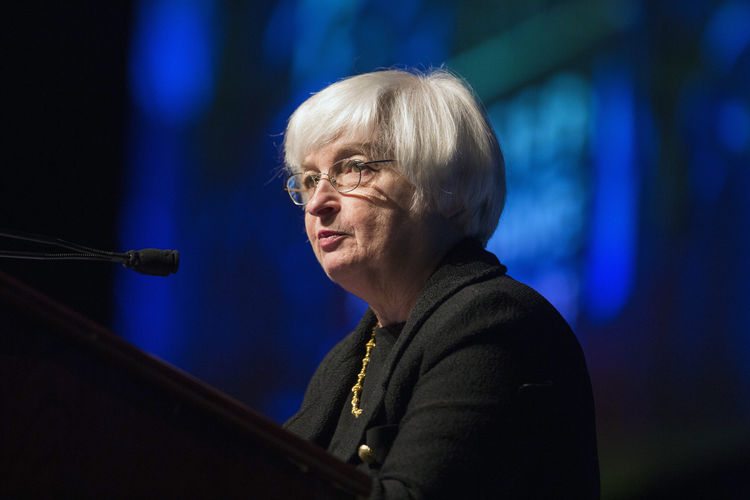- Yellen Keeps a Gradual Rate-Hike Outlook as Inflation Puzzles the Fed
Federal Reserve Chair Janet Yellen said the U.S. economy should continue to expand over the next few years, allowing the central bank to keep raising interest rates, while also stressing a gradual approach to tightening as the Fed monitors too-low inflation.
“Considerable uncertainty always attends the economic outlook,” Yellen said Wednesday in remarks delivered to the U.S House Financial Services Committee. “There is, for example, uncertainty about when — and how much — inflation will respond to tightening resource utilization.”
As is typical in her testimony before the panel, Yellen was asked a broad range of questions, including her views on the national debt, whether regulators have too much input into the decisions of private bank boards, and would she would accept another term as Fed chair.
Her current term expires in February, which could make Wednesday’s hearing one of her last before the House committee. Republicans welcomed her Monetary Policy Report’s discussion of rule-based policy, while Democrats highlighted the Fed’s new attention on racial disparities in the economy.
On monetary policy, Yellen didn’t diverge far from the comments she made at a press conference after the June policy meeting. She sounded slightly more cautious on the inflation outlook, while sticking to an expectation for continued rate hikes and maintaining the initiative to begin reducing the Fed’s balance sheet “relatively soon.”
Consistent Theme
“We thought that it was pretty balanced and a pretty steady continuation of the themes” that Yellen had laid out after the Fed’s meeting last month, said Michael Feroli, chief U.S. economist at JPMorgan Chase & Co. in New York. “It was pretty straight down the middle.”
U.S. stocks remained higher in New York trading after the testimony while Treasury yields fell.
In the question-and-answer session with lawmakers, Yellen indicated the Fed is hewing to a baseline forecast that a prolonged period of moderate growth continues to whittle away at resource slack and gradually boosts prices. Still, the Fed is considering risks around the inflation outlook, even though “temporary” influences, such as the costs of mobile-phone plans and prescription drugs, are holding down price measures for now. Inflation has been below the central bank’s 2 percent target for most of the past five years.
On Path
“To my mind, a prudent course is to make some adjustments as long as our forecast is that we’re heading back to 2 percent” inflation, Yellen said. “It is premature to reach the judgment that we are not on the path to 2 percent inflation over the next couple of years.”
If progress on inflation stalls, “they are more likely to initiate a longer pause in the rate hike cycle,” said Michael Gapen, chief U.S. economist at Barclays Capital Inc. in New York. “I don’t think they will adjust balance sheet policy unless the economy goes into a recession.”
Yellen will appear Thursday before the Senate Banking Committee, wrapping up her final testimony to Congress as Fed chair, unless she is re-nominated by President Donald Trump. Yellen’s current term expires on Feb. 3. She was asked several times about whether she would serve a second term as chair during the House hearing.
“It’s something that hasn’t been an issue so far,” but it’s “certainly something that I would discuss with the president, obviously,” Yellen said in response to a question.
Her assessment of the economy was optimistic. A faster pace of global growth should support U.S. exports, Yellen said, and a recovery in drilling activity should support business investment.
Along with continued job growth and rising income, “these developments should increase resource utilization somewhat further, thereby fostering a stronger pace of wage and price increases,” she said.
Yellen said the central bank’s policy rate “would not have to rise all that much further” to get to a rate that keeps supply and demand in balance in the economy. Eventually, “factors” she did not specify that are holding down the so-called neutral rate will diminish over time, she said, which supports the Fed’s case for continued rate hikes over the next couple of years.
Balance Sheet
She also mentioned that the Fed anticipates it will start reducing its balance sheet “this year.” The size of the balance sheet once this process has been completed is uncertain, she said, partly because the banking system’s demand for reserves is not yet known.
Yellen stepped away from her recent comments that asset prices look “somewhat rich” noting instead that the financial system is strong and resilient, while gains in markets have not been accompanied by a “substantial increase in borrowing.”
“Looking at asset prices and valuations, we try not to opine on whether they’re correct,” she said.
With U.S. economy growing at a steady pace, Yellen’s Fed is gradually pulling back from crisis-era stimulus. It raised interest rates in June for a second time this year and forecast another hike in 2017.
The U.S. expansion is in its ninth year and continues to create jobs without much inflation. Unemployment was 4.4 percent in June and employers have added 187,000 jobs a month on average over the past 12 months. But stronger demand for labor hasn’t fed into higher wages.



 Naira4 weeks ago
Naira4 weeks ago


 Naira3 weeks ago
Naira3 weeks ago


 News4 weeks ago
News4 weeks ago
 Travel4 weeks ago
Travel4 weeks ago




 Naira4 weeks ago
Naira4 weeks ago
 Naira3 weeks ago
Naira3 weeks ago


 Jobs3 weeks ago
Jobs3 weeks ago


 Travel3 weeks ago
Travel3 weeks ago




















